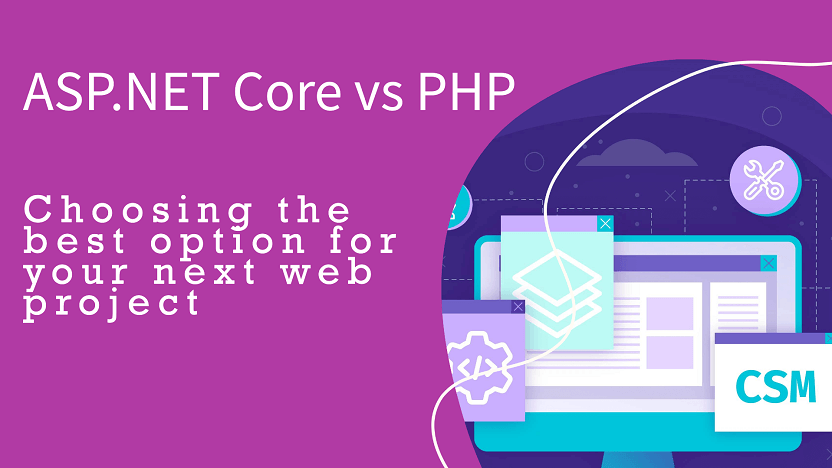Choosing the right web development framework is a crucial step in ensuring the success of your project. Both ASP.NET Core and PHP have their strengths and weaknesses, making them popular choices for different types of web applications. Let’s dive into the key areas to help you decide which is better for your next web project.
Performance Comparison
ASP.NET Core:
ASP.NET Core offers high performance, particularly for large-scale, high-traffic applications. It uses a powerful and lightweight runtime that boosts processing speed and reduces latency. Additionally, ASP.NET Core leverages asynchronous programming, allowing applications to handle more tasks simultaneously without slowing down.
This makes ASP.NET Core an ideal choice for projects where speed and performance are critical, such as eCommerce platforms, real-time applications, or enterprise-level software.
PHP:
While PHP has made significant strides in performance with the release of PHP 7 and PHP 8, it typically lags behind ASP.NET Core in handling high-volume traffic or large, complex applications. PHP’s default synchronous execution model may not perform as well as ASP.NET Core in certain scenarios, although popular frameworks like Laravel and Symfony help improve efficiency.
For smaller projects or content-based websites, PHP’s performance is more than adequate, offering a balance between simplicity and speed.
Learning Curve and Ease of Use
ASP.NET Core:
ASP.NET Core has a steeper learning curve, especially for those who are not familiar with the .NET ecosystem. It requires knowledge of C# and object-oriented programming, which may slow down beginners. However, for experienced developers, especially those already working within the Microsoft ecosystem, ASP.NET Core provides a robust and flexible development environment.
PHP:
PHP development is one of the easiest programming languages to learn, making it a go-to for many beginner developers. Its straightforward syntax and easy setup allow developers to build functional websites quickly. Many hosting services offer out-of-the-box PHP support, which can speed up the development process.
If your team includes less-experienced developers or you’re working on a simple web project, PHP can offer a faster start.
Cross-Platform Support
ASP.NET Core:
ASP.NET Core is designed to run on multiple platforms, including Windows, Linux, and macOS. This flexibility allows developers to deploy applications across different environments without the need to rebuild or modify the code significantly. Cross-platform compatibility is one of the reasons ASP.NET Core is becoming increasingly popular for cloud-based applications.
PHP:
PHP is inherently cross-platform and works well on a variety of operating systems. It’s most commonly deployed on Linux servers, especially in LAMP (Linux, Apache, MySQL, PHP) environments. While PHP is also supported on Windows and macOS, it’s predominantly used in Linux-based deployments.
Both ASP.NET Core and PHP offer cross-platform capabilities, but ASP.NET Core is particularly well-suited for modern cloud and multi-platform applications.
Security Features
ASP.NET Core:
ASP.NET Core is a strong contender when it comes to security. It provides built-in security features, such as identity management, token-based authentication, and data encryption. Additionally, Microsoft regularly updates ASP.NET Core to address new security threats, making it a reliable choice for businesses that prioritize cybersecurity.
PHP:
PHP also offers security capabilities, but much of the responsibility for secure coding practices lies with the developer. Popular PHP frameworks like Laravel come with features such as CSRF protection and encrypted passwords. However, PHP applications are often more susceptible to security vulnerabilities if developers don’t follow best practices.
For high-security projects, ASP.NET Core provides more built-in protection and updates, reducing risks.
Cost and Affordability
ASP.NET Core:
While ASP.NET Core is open-source and free, many of the tools and services associated with the .NET ecosystem, such as Visual Studio and Microsoft Azure, can come with additional costs. These costs can add up for small businesses or startups but are often justified by the high level of performance and support provided.
PHP:
PHP is completely free and runs on open-source platforms like Linux, which makes it a more budget-friendly option for smaller businesses or developers working on a tight budget. Many shared hosting services offer PHP support at low costs, making it an affordable choice for small to medium-sized projects.
Development Speed
ASP.NET Core:
ASP.NET Core offers powerful development tools like Visual Studio, which includes features like IntelliSense and debugging that speed up the development process. However, due to its complexity, setting up an ASP.NET Core project can take more time than PHP, especially for beginners.
PHP:
PHP is known for its fast development cycle. Its simple syntax and the availability of numerous open-source libraries and frameworks allow developers to build applications quickly. This makes PHP ideal for projects where speed is a priority, such as simple websites or content management systems.
Community Support
ASP.NET Core:
As part of the Microsoft ecosystem, ASP.NET Core has strong enterprise support and an active developer community. Developers can access extensive documentation, forums, and third-party tools to enhance the development process. Paid support is also available for businesses that require additional help.
PHP:
PHP boasts a large and active community, thanks to its long-standing presence in the web development space. There is a wealth of free online resources, tutorials, and forums, making it easy for developers to find help when needed. PHP’s large ecosystem of open-source libraries also contributes to faster development.
Suitability for Large and Complex Projects
ASP.NET Core:
ASP.NET Core excels in large, complex projects that require scalability, high performance, and robust security features. It’s widely used for enterprise-level applications, where long-term reliability and flexibility are key.
PHP:
PHP is best suited for small to medium-sized projects like blogs, content management systems, and smaller web applications. While PHP can be used for larger projects, it often requires more effort to ensure scalability and performance, especially for complex applications.
Conclusion: Which Framework Should You Choose?
- Choose ASP.NET Core if you’re building a large-scale, enterprise-level web application that demands high performance, security, and scalability. It’s also a great option if your project relies on cross-platform deployment or is tied to the Microsoft ecosystem.
- Choose PHP if you’re working on a smaller project or need a cost-effective solution with a quick turnaround. PHP’s simplicity and affordability make it perfect for small businesses, blogs, and content-based websites.
Ultimately, the best choice depends on the specific needs and goals of your web project. Both ASP.NET Core and PHP have their strengths, and understanding how they align with your project requirements will help you make the right decision.

